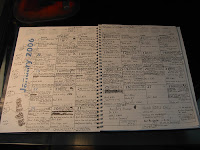 |
| My bosses |
I am a full time freelance writer. I am also a work-at-home mom (WAHM).
In many ways, my life as a writer and my life as a mom blend together seamlessly. In other ways, I find myself wondering if my children are sacrificing for my career, or if my career is sacrificing for my children.
I think sometimes people think WAHMs have it "easy." After all, they get to work from home, they get to play with their kid(s) all day, and they get to do it all in their pajamas with
Days of Our Lives playing during nap time. Right?
Well, not so much.
In order for me to be successful as a WAHM (which means success as a writer
and as a mom), I've had to approach my day very differently than a SAHM (stay-at-home mom) or a WOHM (work-outside-the-home mom) does. The biggest difference is in my daily schedule.
I have a very detailed daily schedule. In fact, according to my schedule I have very little down time. In practice, there's more down time than it appears, but I've padded the tasks I have to do each day to allow for distractions or side-tracking caused by "my bosses" (see photo above). If I don't have a very structured schedule, it's too easy for me to not get things done because I figure I can do them later. As it is, I can look at my schedule and simply do what it says to do during a certain time slot and know that, by the end of the day, I'll have gotten through the things I needed to do.
I also get up earlier than the rest of my family. My husband gets up around 7:15 every morning to get ready for work during the week. Bean is up between 9:30 and 10:00 every morning. (Bunny kind of does her own thing.) I get up at 5:00 a.m. every morning (including weekends) and get ready for the day, then spend time working until everyone else gets up. Having that extra time is what I need to get my day going on my terms so I can have a good day once the kids are up.
Though this is one thing I'm still working on, being highly organized is also key to being a successful WAHM. Not only do I have to stay organized to stay on top of deadlines and in contact with clients, but I have to stay organized to stay on top of my home responsibilities. I have lists and a calendar and I write everything down so I don't forget anything.
The biggest thing, which I know I've mentioned many times, is balance. When you work from home, you can't work all the time, and you can't let yourself get distracted so that you don't get anything done.
It's not easy, but I have to tell you that making it work is definitely worth it to get to spend so much time with my kids, and to get paid to do what I love so much.










